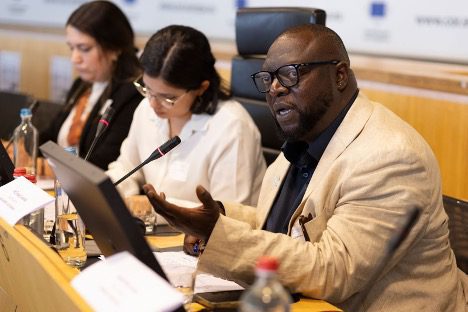NEWS
November 20, 2023

IN BRIEF
Governments and institutions have a crucial role in supporting and empowering young people in their efforts to promote democratic change and innovation. International Democracy Day Brussels is an annual event that gathers organizations and experts to celebrate democracy and discuss its challenges. The theme for this year is ‘Empowering the next generation,’ focusing on young people’s essential role in advancing democracy and ensuring their voices are included in decisions that profoundly impact their world. In this year’s event, McDonald Lewanika, the Regional Director for East and Southern Africa at Accountability Lab, shared his insights on youth-led initiatives, the state of [...]
SHARE
Governments and institutions have a crucial role in supporting and empowering young people in their efforts to promote democratic change and innovation. International Democracy Day Brussels is an annual event that gathers organizations and experts to celebrate democracy and discuss its challenges. The theme for this year is ‘Empowering the next generation,’ focusing on young people’s essential role in advancing democracy and ensuring their voices are included in decisions that profoundly impact their world. In this year’s event, McDonald Lewanika, the Regional Director for East and Southern Africa at Accountability Lab, shared his insights on youth-led initiatives, the state of democracy, and the role of governments and institutions in supporting democratic change and innovation.
In this article, McDonald shares his thoughts and experiences, highlighting the importance of involving and empowering young people in the democratic process and how these initiatives can shape the future of democracy. He asserts that their responsibilities are twofold. First, governments should “create space for meaningful engagement,” emphasizing that “governments should ensure a conducive environment for the free expression of ideas and participation.” He explains that in many places, repressive legislation and restrictions on civic space have hindered young people’s active engagement. McDonald affirms, “To nurture democracy, it is imperative to remove these barriers and promote an environment where all voices can be heard.” International Democracy Day serves not only as a celebration but as an opportunity to reflect on the state of democracy and the role of young people as custodians of the future. “International Democracy Day serves as a reminder that democracy is a living concept. And young people are not just the future; they are the driving force of change in the present,” explains McDonald.
He believes involving the youth in the democratic process is about their inclusion and leadership. As he points out, “Young people are able to organize themselves for fun. If they can organize at that level, they cannot fail to organize themselves politically if they choose to.” McDonald further notes that “young people often bring innovative ideas and are more attuned to the daily challenges.” These challenges, often unique to the younger generation, demand fresh solutions. McDonald points to various examples of youth-led initiatives worldwide, including Nigeria’s ‘Not Too Young To Run’ campaign. This initiative advocates for youth participation in politics and has made significant strides in reshaping the political landscape. These examples vividly demonstrate that youth can be catalysts for change, bringing new perspectives and innovative solutions to the democratic table.
Institutions must “meet young people where they are.” This involves using methods, languages, and engagement strategies that resonate with the younger generation. McDonald adds, “Understanding the context and preferences of youth is vital for effective engagement.” By adapting to the needs and interests of young people, institutions can bridge the gap and build a meaningful connection. Instead of viewing youth engagement as a challenge, they should see it as an opportunity to infuse energy and innovation into the democratic process. Additionally, McDonald underscores the need to be brave and allow young people to take leadership roles. Given the demographics, he emphasizes, “young leaders should play a predominant role in shaping the democratic landscape.” This shift toward youth leadership should not just be seen as a symbolic gesture but a practical necessity to align with the demographic realities of our time.
McDonald explains how Accountability Lab has adopted a dynamic approach to youth engagement. “At Accountability Lab, we use modern methods, such as arts and technology, to connect with young people. Projects like Voice2Rep, Film Fellowship, HackCorruption, and others ensure that young people see representations of themselves and find meaning in their work.” The organization’s focus on technology and creative approaches aligns with the preferences and interests of the youth, making them more receptive to democratic engagement. Accountability Lab’s commitment to nurturing these initiatives demonstrates the transformative power of connecting with young people on their terms. Young people are not just beneficiaries of democracy; they are its champions. Governments and institutions must adapt to meet the needs and preferences of young people while providing the necessary space for their participation.
International Democracy Day serves not only as a celebration but as an opportunity to reflect on the state of democracy and the role of young people as custodians of the future. McDonald’s insights shed light on the vital role that young leaders play in shaping the democratic landscape, offering hope for a more inclusive, innovative, and robust future for global democracy. The world must heed the call to empower and support the youth, for they are the architects of a brighter democratic tomorrow. He affirms, “Institutions are challenged to change how they think about youth engagement and empowering young people. Leaders must be predominantly young people, particularly young women because that is what the demographic realities tell us. Suppose we intend to replace the narrative and sponsor notions around fairness, social justice, and equal representation. In that case, we must be brave enough to allow young people to lead all the interventions and spaces currently there.”
